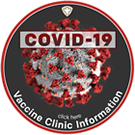
West Nile Virus
West Nile Virus (WNV) is a disease that can cause encephalitis, an inflammation of the brain, in humans and other animals. Transmission occurs when mosquitoes become infected with WNV when they feed on infected birds. These infected mosquitoes can then transmit the virus to humans, birds, and animals.
WNV is not spread by person-to person contact or directly from birds to people.
West Nile Virus Surveillance
In an effort to monitor the spread of WNV throughout the state, the Illinois Department of Public Health, in conjunction with local health departments, tests mosquitoes and dead birds for possible infestation.
The surveillance season begins in early May and ends by October. During this period, Knox County Health Department collects mosquito samples as well as dead birds appearing to have died due to natural causes to submit for laboratory analysis.
The State Health Department is allowing the following birds to be submitted for West Nile virus testing:
All perching birds (passiforms) such as:
crow blue jay grackle starling robin finch
sparrow cardinal swallow flycatcher cat bird mockingbird warbler wren (No waterfowl, larger birds such as vultures, or endangered birds will be tested.)
If a dead bird on the list is found between May 1st and October 15th and appears to have died of natural causes, you should report the "sighting" to the Knox County Health Department at 309-344-2224.
Please remember:
The State Health Department allows for only a limited number of birds per county to be tested, so not every bird reported can be tested.
Additional Information:
- IDPH West Nile Virus
- CDC West Nile Virus
- Frequently Asked Questions about Mosquito Prevention
- Using Insect Repellent Safely
About Zika
Zika virus is a virus similar to dengue, yellow fever, and West Nile and is primarily transmitted through mosquitoes and sex. The Zika virus outbreak in the Caribbean, and Central and South Americas has led to reports of pregnant women giving birth to babies with birth defects, poor pregnancy outcomes, and Guillain-Barre syndrome.
From the Illinois Department of Public Health
If you have returned from a country where Zika virus is circulating and you have symptoms of Zika virus in the two weeks following your return, call your doctor and report your travel history and symptoms.
If you are a doctor seeing a symptomatic patient who has traveled to a country where Zika virus is circulating, please contact your local health department to discuss possible Zika virus testing.
The IDPH Zika Virus Action Plan outlines how IDPH environmental health, communicable disease, laboratory, preparedness and response, women’s health and family services, and communications staff will work with local health departments, blood supply centers, and other partners to verify local transmission of Zika virus, inform the public, and prevent further spread.
Additional Zika Information





